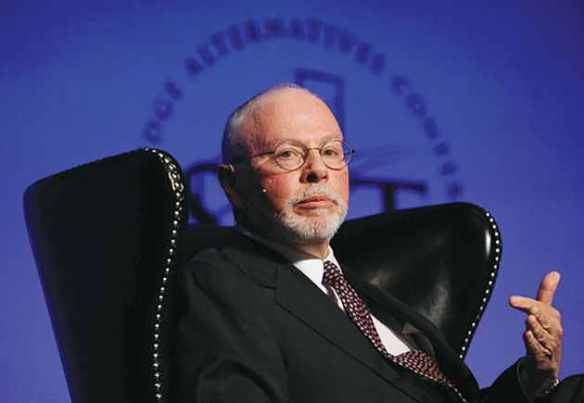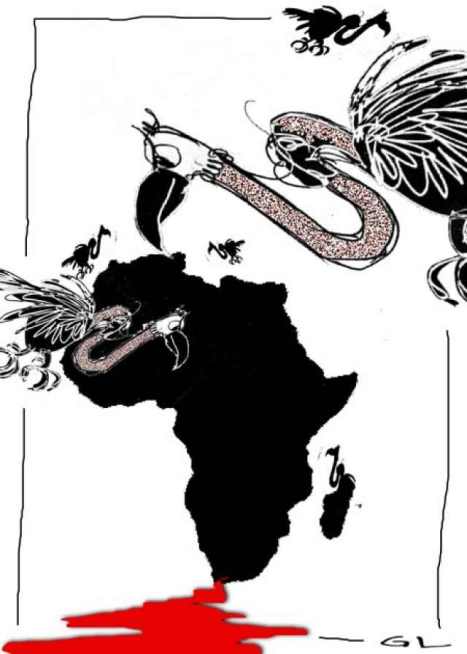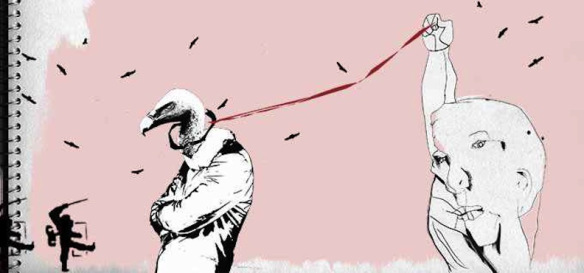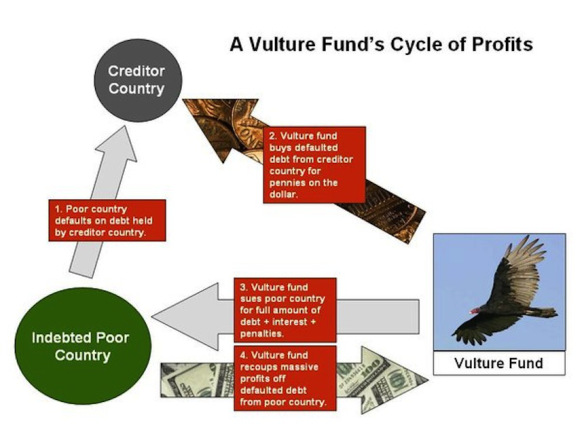by Scott Long
November 5, 2013
This article was originally published on the author’s blog, a paper bird.

The Human Rights Campaign (HRC), the largest US gay organization, is going international. It’s just been given at least $3 million to spread the word of marriage equality to benighted countries that treat gays badly. Unfortunately, there’s a catch. Its chief partner and donor in this project wants the people in those countries, LGBT folk included, to starve–their economies wrecked, their incomes shipped abroad, their resources squeezed and stolen to pay off odious debt. HRC is receiving its money for gay rights in the Third World from the man who “virtually invented vulture funds”: a form of speculation that’s one of the worst contributors to Third World poverty ever.
But if you’re poor and getting poorer, look on the bright side (as long as river blindness hasn’t got you, that is). You can still have a nice white wedding; and you’ll save on the food bill if your nation has no food.
HRC is understandably happy about the sunny prospects opening up. It says,
The need to support LGBT advocates and call out U.S.-based anti-equality organizations abroad has never been greater. […] At the same time, opportunities exist for a global equality movement as a growing number of countries are passing pro-equality legislation and recognizing marriage equality. Seventeen countries around the world afford, or will soon afford, committed and loving gay and lesbian couples the legal right to marry.
One of the two big donors to this project is a little more explicit about how the enterprise relates to the projection of US power:
Every day around the world, LGBT individuals face arrest, imprisonment, torture and even execution just for being who they are,” said Paul Singer. “Some of the worst offenders in this area also happen to be the same regimes that have dedicated themselves to harming the United States and its democratic allies across the globe. [Emphasis added] As an organization that has been at the forefront of the equality movement for over three decades, the Human Rights Campaign is uniquely positioned to work in tandem with NGOs to empower LGBT and human rights advocates abroad and help stop these abuses.
Well, yes, except … this doesn’t quite sound like “human rights” envisioned from the high vantage of universality and internationalism. It sounds like LGBT rights uneasily painted into a picture of US interests.

Paul Singer (Jacob Kepler/Bloomberg/Getty Images)
On the other hand, it’s natural to couch the project in terms of what the US will get out of it. After all, its two deep-pocketed benefactors are Singer, who runs a hedge fund called Elliott Management, and Daniel S. Loeb, who runs another called Third Point LLC. They’re both conservatives and huge donors to the Republican Party. Singer underwrote last year’s GOP National Convention with $1 million of largesse. One operative called him “the big power broker in the Republican financial world.” The Wall Street Journal wrote that:
He has given more to the GOP and its candidates–$2.3 million this election season–than anyone else on Wall Street, helping make his hedge fund […] one of the nation’s biggest sources of political donations, the vast majority to the GOP.
The New York Times writes that Singer “believes in the doctrine of American exceptionalism and is wary about United States involvement in ‘international organizations and alliances.’” (Apparently HRC won’t be supporting the hundreds of LGBT activists and groups who fight for their rights at the vile, collectivist UN.) Singer is a nexus of con and neocon ties and tendrils; he chairs the Manhattan Institute, a conservative think tank, and has served on the board of Commentary magazine, the national journal of Podhoretzstan. He’s ladled at least $3.6 million to the self-styled Foundation for Defense of Democracies, a hawksh outfit which Glenn Greenwald called “basically a Who’s Who of every unhinged neocon extremist in the country.” Dan Senor — the glib apologist who served as authorized liar and TV personality for the Coalition Provisional Authority while the Bush Administration devastated Iraq — is one of Singer’s foreign policy advisors.

Daniel S. Loeb
Loeb, meanwhile, supported Barack Obama in 2008, but turned on him when the President ungratefully demanded that Wall Street let itself be regulated a little. In a celebrated email announcing his desertion he cast the President as abusive husband, with a bunch of submissive bankers as his bruised brides: “When he beats us, he doesn’t mean it … he usually doesn’t hit me in the face [so] it doesn’t show except for that one time … he’s not that bad really, unless he gets drunk (from power) …”
Probably this was irony; I mean, a sheltered guy worth billions wouldn’t seriously compare himself to a poor woman living in a shelter, would he? By April 2011, Loeb had given almost $500,000 to the GOP, and he kept giving. In mid-2012, he co-hosted a $25,000-a-plate fundraiser for Mitt Romney in the Hamptons. Mocked for extravagance, the proceedings seem to have furnished Romney with the intellectual foundations for his later comments about the wrongly franchised 47%. A guest lumbering up in a Range Rover told the media that,
I don’t think the common person is getting it. […] We’ve got the message,” she added. “But my college kid, the baby sitters, the nails ladies–everybody who’s got the right to vote–they don’t understand what’s going on. I just think if you’re lower income–one, you’re not as educated, two, they don’t understand how it works, they don’t understand how the systems work, they don’t understand the impact.”
But all this GOP-ness isn’t the most interesting part. What matters isn’t where these guys give their money. It’s where they get it.
Curious how no one asks this. In gratitude for their generosity, HRC arranged for the two donors to feature in a puff piece yesterday by Frank Bruni, the New York Times’ designated homosexual. “Elliott Management’s lofty offices in Midtown Manhattan look north, south, east and west across the borough’s thicket of skyscrapers.” The view was terribly distracting for Bruni, who probably lives, like most Times writers, in a windowless Bronx tenement where he makes matchsticks to pay the bills.
I sat in a 30th-floor library with the hedge fund’s founder and chief executive, Paul Singer, a billionaire who was one of the most important donors to Mitt Romney in 2012 … He’s wary of speaking with journalists, so much so that I’ve seen the adjective “reclusive” attached to his name.
The piece is all about Singer’s lavish giving for gay marriage, and it exhibits, if beneath the surface, the historical function of philanthropy: to silence annoying questions about where you got your fortune. “The battlefield” for gay rights “isn’t what it used to be,” Bruni wrote gauzily. “From the 30th floor, I could see that most clearly of all.” But there are other battlefields Bruni chose not to see.
Paul Singer runs a vulture fund. He makes his profits from the debt incurred by Third World countries–I won’t use the PC term “developing” countries, because the point of the debt is to prevent them from developing–and from the misery it causes their citizens. Of all the parasites in the global economy, of all the profiteers of poverty, vulture funds may be the worst.
Vulture funds operate by buying up a country’s distressed debt just as the original lenders are about to write it off – usually, as the Guardian describes it, when the country “is in a state of chaos. When the country has stabilised, vulture funds return to demand millions of dollars in interest repayments and fees on the original debt.” In other words, you purchase the right to be a hardassed debt collector, and to harass and impoverish whole populations till you get your cash. Singer, says the BBC, “virtually invented vulture funds.” A University of Pennsylvania expert on emerging-market debt told Bloomberg that Singer’s “actions are amoral,” adding that he puts the squeeze on “without worrying about the potential consequences for the country involved.”
That’s an understatement. Three examples of Singer’s work:
Peru: In 1996, just as Peru embarked on restructuring its massive debts, Singer’s hedge fund bought $20.7 million worth of old loans to the country — paying only $11.4 million, a huge discount. They immediately rejected the restructuring and sued Peru in a New York court, for the original value of the loans plus interest. As the USA Jubilee Network explains, they “won a $58 million settlement and made a $47 million profit — a 400% return.”
Peru, however, couldn’t pay the sum. Instead, it put priority on paying back its other debtors, who had participated in the restructuring. Singer actually took out an injunction to keep Peru from repaying anyone else, thus shoving the entire country back toward default in the name of his own profits. Jubilee writes that “Elliott pioneered this litigate-into-submission strategy that allows these vultures to collect astronomical profits on countries in economic stress.”
Investigative journalist Greg Palast claims that Singer finally got his money when authoritarian President Alberto Fujimori had to flee the country in 2000. Singer and his repo men, he says, put a lien on the Presidential plane before Fujimori could reach it — then demanded the full sum from the desperate dictator before giving it back. Singer piously defends his work as promoting “transparency” among foreign governments. Getting a corrupt leader to ransom away his country’s resources to save his skin hardly fits that description.

Congo-Brazzaville: In the late 1990s, Singer’s Elliott Associates used a Cayman Islands-based subsidiary called Kensington International to buy, at a discount, over $30 million worth of defaulted debt issued by the Republic of Congo (Congo-Brazzaville) — by some reports, paying only $1.8 million. It then sued the government for almost $120 million in repayments plus interest. That’s a 10,000% profit.
A UK court handed Singer victory in a succession of judgements in 2002 and 2003. The Congolese government couldn’t pay up, though: interest continued to accrue at a rate of $22,008.23 per day. Congo-Brazzaville’s GDP per person at the time averaged around $800. More than a quarter of deaths of children under 5 were from malnutrition. The country had, according to the Financial Times, ”one of the highest foreign debts per capita of any developing country, estimated at $9 billion for a population of fewer than 4 million people” — and, following Singer’s model, private vulture funds hurriedly bought up about a tenth of that.
Singer and Kensington relentlessly chased Congolese assets in courts around the world. In 2005, another UK judge gave them partial satisfaction. He let Singer intercept and expropriate $39 million in Congolese oil sales to a Swiss firm. That’s still more than a 2000% profit, not bad when your only productive work is pushing paper. Other firms that have speculated in Congolese debts, though, continue hounding the impoverished country’s resources from court to court.
Argentina:In 2001, Argentina had a revolution: citizens banging pots and pans in the public squares threw out a neoliberal regime that had driven the country into depression and stolen almost everybody’s savings. A new government of economic nationalists defied the Washington Consensus by defaulting on more than $80 billion in foreign debt and devaluing the currency. It worked: reasserting domestic control gradually revived the moribund economy.
That was the good news. Meanwhile, though, one of Singer’s companies called NML Capital Ltd. sniffed future profit. It bought over $180 million of the defaulted debt at between 15 and 30 cents on the dollar.
In 2005, Argentina’s President, Nestor Kirchner, offered lenders 30 cents on the dollar to forgive its debts. The vast majority of bondholders accepted the offer; Singer rejected it and demanded full repayment. Argentina’s legislature passed a law that barred the government from raising the offer — a sign, if one were needed, that Singer’s demands flouted the democratic will of a nation of 40 million. Singer refused to budge. He took Argentina to court in the US and elsewhere. In 2012, he actually managed to impound an Argentinian naval vessel while it rested in an African port, demanding an extortionary sum to release it until the International Tribunal on the Law of the Sea ordered it freed.
European judges have found against Singer, but in 2006 he won a judgment for $284 million in the U.S. (That would be at least a 500% profit.) The case is still in court. Singer’s pursued the same strategy he did with Peru, demanding that Argentina be barred from paying any creditors who joined the restructuring unless he‘s repaid in full. Either Argentina will be semi-bankrupted by his greed, or it will suspend its obligations indefinitely; in either case, that’s too much uncertainty for most lenders. Singer has pretty much singlehandedly kept Argentina an unsafe investment. The US judiciary’s willingness to buy his arguments has shaken Latin American financial markets, doubled the cost of Argentina’s borrowing, and pushed the country toward a new, disastrous default. Paul Singer is like honey badger. He don’t care.

Protestor at a Jubilee Debt Campaign demo outside the London offices of Elliott Management, February 2013
The World Bank has called on developed countries to put an end to profiteering like SInger’s. “Vulture funds are a threat to debt relief efforts,” its Vice-President for Poverty Reduction said. “Their increasing litigation against countries receiving debt relief will penalize some of the world’s poorest countries.” George W. Bush’s Treasury Secretary told Congress in 2007 that “I deplore what the vulture funds are doing.” Gordon Brown, the UK Prime Minister, accused them of “perversity” and called them “morally outrageous.” I could go on and on — but so do Singer and his proteges. They don’t stop. The World Bank estimates that vulture funds have sued a third of countries receiving debt relief. Jubilee USA notes that
As of late 2011, 16 of 40 Heavily Indebted Poor Countries (HIPC) surveyed by the International Monetary Fund were facing litigation in 78 individual cases brought by commercial creditors. Of these, 36 cases have resulted in court judgments against HIPCs amounting to approximately $1 billion on original claims worth roughly $500 million.
And no wonder Singer buys up political influence so assiduously. Hector Timerman, Argentina’s Minister of Foreign Affairs, wrote in 2012:
Vulture funds abuse the system, acquiring distressed debt in secondary markets to multiply profits at the expense of the poor and weak. As these activities are ethically repellent, well-prepared propaganda machinery keeps their lucrative business alive.
It’s not just propaganda. Singer needs his paid politicians to fend off scrutiny and guard the “lucrative business” from disruption. A bill to curtail vulture funds’ profiteering was introduced in the US Congress in 2009. The next year, Singer told his heavily funded Manhattan Institute they had to combat “indiscriminate attacks by political leaders against anything that moves in the world of finance.” Will HRC flex its legislative muscle to fight the Stop Vulture Funds Act as well?
It’s a sick irony that the money HRC takes to fund its new work in the Third World is made off the backs of Third World suffering. It’s even worse when HRC’s PR machine colludes with the New York Times to whitewash — pinkwash — Singer’s record of destruction. It’s politically disastrous for an LGBT group to operate this way. They’re sending a message to governments in the developing world that the US really does see LGBT people as a privileged class, and is willing to promote their rights while condoning the immiseration of whole populations. But it’s self-defeating also. LGBT people don’t want this kind of “help.” LGBT people are citizens, workers, children, parents too. HRC should know that they are as affected as anybody when a parasite like Singer enforces endless debt service on states, devastates the necessary services that governments provide, litigates countries into permanent submission. What does HRC think it can give the victims, after Singer has stripped their assets and sold off their national resources? Is same-sex marriage supposed to be a consolation? I’m afraid HRC is acting like old honey badger, too. It just don’t care.
Since Argentina has been one of Singer’s targets, I went to an old colleague of mine, the great Argentinian feminist and sexual rights activist Alejandra Sardá-Chandiramani. Alejandra has fought for the rights of LGBT people throughout Latin America for more than 20 years. She was sad but not shocked at the assembled ironies. She told me:
‘International work’ done ‘for’ LGBTs (or women, development, girls, you name it) from the USA is, first of all, a great industry giving jobs to a vast majority [within the organizations] of USA citizens and also to a few privileged ones from the Global South (I was once among the latter, so I know what I am talking about). There are always a few good souls thrown in the mix, who normally can’t resist too many years. For too long our misfortunes (patriarchal social norms, authoritarian governments, condoned forms of violence, subordinated economies) have made the North rich, sometimes through jobs “saving us” and other times more directly, like in the case of the profits made by the vulture funds or the arms dealers. And they also serve to hide the existence of quite similar phenomena in the Global North itself and to keep the fragile national pride and self-esteem of our ‘saviors’ intact.
“Another thing that does not surprise me,” she writes,
is that a USA based ‘LGBT’ organization accepts money from such a source … [P]articularly in the USA many/most LGBT activists have a hard time linking their issues to broader social, economic and political realities, as they are too self-absorbed in all their identity politics. I hope that not many people in the Global South will agree to do work funded with this extremely dirty money — if they know where it is coming from. But sometimes, people are facing such difficult circumstances that they can’t afford to be so principled.
She adds that “in some Global South countries, activists belong to social and economic elites (this happens particularly in the early stages of movements, as these are the ones that can afford to be out) and they are as ignorant or unconcerned about broader social issues as their USA colleagues, so anything can happen.”

Vultures and their masters, an Argentinian cartoon
Maybe she’s right, but here I’m inclined to differ. Most LGBT movements in the larger world aren’t in their early stages any more. They’re mature and politically sophisticated. They don’t need HRC; try telling someone in South Africa (where LGBT rights are in the Constitution) that they should “learn” from the US. Far more valuable to them are their connections with local civil societies and social movements that fight for people’s real rights and freedoms. They ally with groups that combat maternal mortality, defend the rights to health care and education, press the State to keep the social welfare system functioning, ensure that votes count and that people can decide their collective economic as well as civic future. That’s not what Singer stands for, and outsiders paid from his dirty money may get an unexpectedly cold welcome.
I forgot about Daniel Loeb. He too has a history of bold international interventions, it turns out. If you want to read about him, Vanity Fair has a long piece coming out in its December issue, less puffy than Frank Bruni’s by far. There’s a nugget about how, on a 2002 vacation in Cuba with the heir to the von Furstenberg money, Loeb ran down a child with his car. Cuban authorities held him in the country until — well, whatever. Perhaps he made some investments. A friend recalled,
I truly felt so sorry for him when he told me he had found himself unable to leave the country, curled up in a ball on the floor of his room crying, promising God that he’d do anything if the Almighty got him out of his predicament. It wasn’t as if Dan had done it on purpose, and who really knows what ended up happening to the kid?
A benighted country that’s not the United States, a rich guy, a poor child with tire marks on his back, and — who knows. Isn’t that what the new landscape of LGBT organizing is all about?
Scott Long is a visiting fellow in the Human Rights Program at Harvard Law School, and has worked for decades as a human rights activist in Eastern Europe and Africa.

